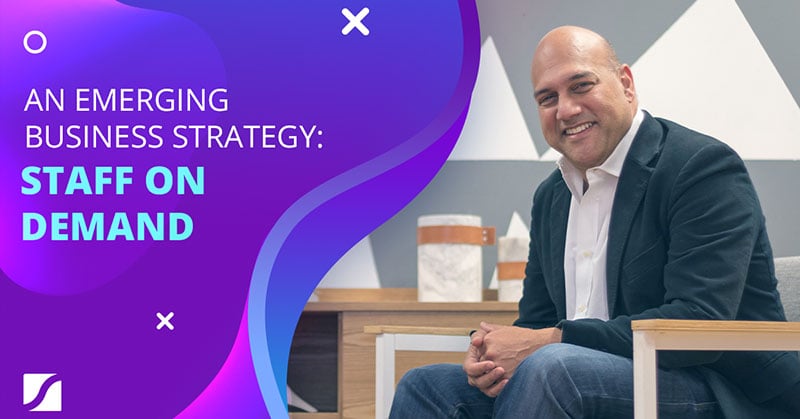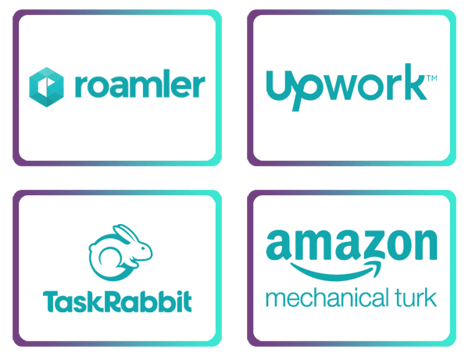An Emerging Business Strategy: Staff On Demand

Traditionally, the larger your organization, the more successful you are. Today, this is no longer a hard and fast rule for every industry.

Take AirBnb for example. With a nimble workforce of 3,100, they are 30 times smaller than the Hyatt hotel chain which has a gigantic workforce of 96,000. Yet, AirBnb will soon be the largest hotel company in the world, while the Hyatt hotel chain lags behind and is unable to keep up with the rapidly shifting dynamics of the industry.
This may seem counterintuitive at first. After all, wouldn’t the organization with more staff be able to accomplish a whole lot more than a smaller team?
What’s AirBnb’s secret? Have they found the formula to hiring exceptionally smart and talented people with superhuman levels of productivity?
Their secret is much simpler. Exponential Organizations (ExOs) like AirBnb simply outsource many of their business functions, while minimizing full-time staff to handle core operations.
This allows them to be agile and cost-effective — a powerful advantage in today’s landscape of rapidly changing market dynamics.
Staff-On-Demand Gives the Advantage Of Agility & Cost-Effectiveness
While maintaining a large permanent workforce is likely to remain more important in certain equipment- and capital-intensive industries such as shipping, mining or construction, in any information-enabled business a large internal staff seems increasingly unnecessary, counterproductive and expensive.

A large workforce only becomes an anchor for information-enabled businesses because it reduces maneuverability in the face of today’s rapidly changing information age.
Think of it like maneuvering a big ship versus a speedboat. If the weather suddenly changes and you need to make a 180° turn, a small speedboat will be able to do so in a matter of seconds with very little extra energy needed to make the turn. A big ship, however, has hundreds of complex parts and mechanisms to control, hence execution will be slower. As the ship is also physically much bigger, it would be much slower to turn and requires a lot more force and energy to do so.
This is why having staff-on-demand has been one of the core attributes of ExOs, which I’ve observed in my research of 100 ExOs to discover what makes them able to quickly scale up and create massive impact.
Simply put, engaging staff-on-demand allows ExOs to be nomadic, flexible, and agile to outmaneuver the Goliaths of their industry who are weighed down by a lumbering workforce. An example of how nomadic, flexible and agile ExOs have toppled industry giants with staff-on-demand are Uber and Lyft. These ride-hailing apps allow anyone with a car and a smartphone to work for Uber or Lyft anytime, anywhere, to provide transportation services. This has completely disrupted and toppled the cab industry, even to the point of sparking legal battles in some countries.
An example of how nomadic, flexible and agile ExOs have toppled industry giants with staff-on-demand are Uber and Lyft. These ride-hailing apps allow anyone with a car and a smartphone to work for Uber or Lyft anytime, anywhere, to provide transportation services. This has completely disrupted and toppled the cab industry, even to the point of sparking legal battles in some countries. Uber and Lyft’s business model of operating with subcontractors doesn’t just make them agile and flexible to rapidly expand worldwide, it also makes them cost-effective because they don’t even own the cars. Effectively, this has significantly diminished the capital required to purchase assets, reduce the cost of maintaining assets, and completely eliminate the depreciation in value of assets for Uber and Lyft. If you want to follow the process of companies that have succeeded using Staff on Demand, check our new Staff-on-Demand tool.
Uber and Lyft’s business model of operating with subcontractors doesn’t just make them agile and flexible to rapidly expand worldwide, it also makes them cost-effective because they don’t even own the cars. Effectively, this has significantly diminished the capital required to purchase assets, reduce the cost of maintaining assets, and completely eliminate the depreciation in value of assets for Uber and Lyft. If you want to follow the process of companies that have succeeded using Staff on Demand, check our new Staff-on-Demand tool.
Leveraging Staff-On-Demand For Speed, Functionality & Flexibility
For any company today, having a permanent, full-time workforce is fraught with growing peril as employees fail to keep their skills up to date, resulting in personnel in need of greater management.In our fast-changing global and internet-driven marketplace, increasingly desperate organizations are turning to external and temporary workforces to fill their expertise gaps so they can maintain speed, functionality and flexibility in a fast-changing world.
What this means is outsourcing mission-critical roles as well, which is the real secret of success ExOs know. These leading organizations recognize that leveraging personnel outside the base organization is key to creating and running a successful ExO. The fact is, no matter how talented your employees, chances are that most of them are becoming obsolete and uncompetitive right before your eyes.
 For example, in an effort to keep the overall skills of the organization fresh, AMP, Australia’s largest insurance company, requires that half its 2,600-strong IT department be made up of contractors. According to Annalie Killian, a global executive at AMP, such a requirement is not just helpful; in this day and age, it’s mandatory.
For example, in an effort to keep the overall skills of the organization fresh, AMP, Australia’s largest insurance company, requires that half its 2,600-strong IT department be made up of contractors. According to Annalie Killian, a global executive at AMP, such a requirement is not just helpful; in this day and age, it’s mandatory.
Outsourcing Brings In Diversity Of Ideas, Intelligence & Innovations
There’s another angle to outsourcing beyond making your organization agile, cost-effective, functional, flexible, and fresh. It can also increase the diversity of ideas, intelligence, and innovations. One platform that makes it possible for organizations to tap into external expertise is Kaggle, which offers a platform that hosts private and public algorithm contests. These contests can engage more than 185,000 data scientists around the world who vie for prizes and recognition.
One platform that makes it possible for organizations to tap into external expertise is Kaggle, which offers a platform that hosts private and public algorithm contests. These contests can engage more than 185,000 data scientists around the world who vie for prizes and recognition.In 2011, Insurance giant Allstate, who already has 40 of the best actuaries and data scientists money could buy as part of their staff, wanted to see if its claims algorithm could be improved upon, so it ran a contest on Kaggle.
 It turned out that the Allstate algorithm, which has been carefully optimized for over six decades, was bested within three days by 107 competing teams. Three months later, when the contest ended, Allstate’s original algorithm had been improved by 271%. The cost of this investment? A prize money of just $10,000. And the result? Allstate reaped a cost savings of tens of millions annually due to better algorithms.
It turned out that the Allstate algorithm, which has been carefully optimized for over six decades, was bested within three days by 107 competing teams. Three months later, when the contest ended, Allstate’s original algorithm had been improved by 271%. The cost of this investment? A prize money of just $10,000. And the result? Allstate reaped a cost savings of tens of millions annually due to better algorithms.The success of Allstate’s outsourcing is no flash in the pan nor fluke. It was found that in over 150 of Kaggle’s contests, external data scientists have beaten the internal algorithms, often by a wide margin. And in most cases outsiders (non-experts) have beaten the experts in a particular domain, which shows the power of fresh thinking and diverse perspectives.
The concept of outsourcing for ideas and information isn’t simply limited to directly hiring external experts as and when needed. For example, Google has very cleverly merged the concept of outsourcing with algorithms.
 Google has a workforce of 50,000 very smart employees, yet even this pales in comparison to the collective intelligence of the 2.4 billion people online today. By using algorithms for their search engines, Google has effectively tapped into the minds of practically everyone on the internet to contribute to their research and development of their search engine; a feat practically impossible to achieve by the traditional route of full-time research teams conducting surveys and on-ground listening.
Google has a workforce of 50,000 very smart employees, yet even this pales in comparison to the collective intelligence of the 2.4 billion people online today. By using algorithms for their search engines, Google has effectively tapped into the minds of practically everyone on the internet to contribute to their research and development of their search engine; a feat practically impossible to achieve by the traditional route of full-time research teams conducting surveys and on-ground listening.
How To Leverage An External Workforce Effectively
The old argument that freelancers and contractors only increase the bureaucracy needed to manage them quickly falls away thanks to the internet. With online-matching services and social media, the cost of finding and hiring outside staff drops almost to zero.
In addition, due to the rapid rise in the number of internet users, the volume and quality of freelancers has gone up dramatically in the last 15 years or so. Since 2005, 60% of net job growth in US were independent contractors and freelancers.
It is now extremely easy for any startup or mid-market company to begin outsourcing and reap its powerful benefits. You can outsource just about anything on platforms such as Gigwalk, where for a small fee, half a million people with a smartphone can perform tasks for you that would cost millions per year if you had a permanent workforce on the ground.

Take a look at how Proctor and Gamble has used Gigwalk. Whenever Proctor and Gamble needs to know how and where its merchandise is being placed on Walmart shelves around the world, it can use Gigwalk’s platform to instantly deploy thousands of people who are paid a few dollars to walk into Walmart and check the shelves. Results come in within an hour.

Staff-on-demand initiatives similar to Gigwalk which you can tap into are springing up everywhere. The first wave of this new model included companies like oDesk, Roamler, Upwork (formerly known as Elance), TaskRabbit and Amazon’s venerable Mechanical Turk springing up as platforms where all levels of work, including highly skilled labor, can be outsourced. Social media recommendations and networking through sites like LinkedIn can also lead to effective outsourcing. This also optimizes the concept of paying for performance to lower customer risk.
The Leaner You Are, The Fitter You Are
Companies that combine a lean workforce with staff-on-demand are like ultra fit athletes running a marathon, while traditional businesses still carry around the workforces they own like hundred-pound weights on their back.
Start by looking into what tasks you can outsource as well as which expertise gaps you need to fill in your organizations, and you’ll be well on your way to improving your organizations agility, speed, flexibility and cost-effectiveness needed to succeed in today’s business landscape.
When you're ready to get started, follow the process existing ExO's have used with our new Staff-on-Demand tool.
For a practical way to learn how to apply this tool into your current business while getting mentorship, peer-to-peer feedback, and customized support as you implement, check out my Exponential Organization Master Business Course here.
Download SoD Tool
Want to implement this concept in your own business?
For more guidance on this, get the step-by-step tool for where to start and how to implement it in your organization.


%20(1).png?width=864&name=AnyConv.com__SOD%20hor%20ban%20(1)%20(1).png)

